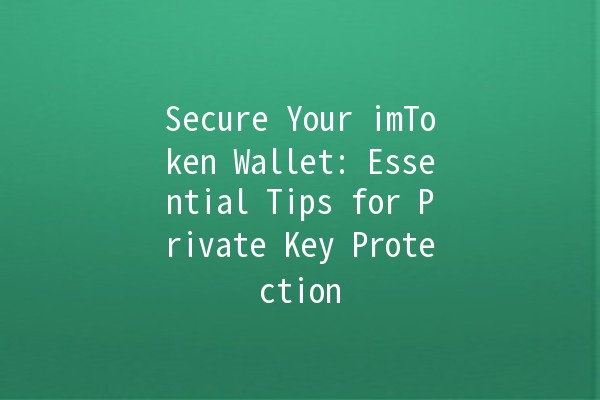In the realm of cryptocurrencies, the importance of securely managing your private keys cannot be overstated. For many users, ewallets like imToken have become a goto solution for storing their digital assets. However, with great convenience comes great responsibility. This article aims to equip you with practical tips for protecting your private keys, ensuring the security of your cryptocurrency holdings.
Before diving into protection strategies, let's clarify what private keys are. A private key is a string of characters that allows you to access and manage your cryptocurrency holdings. Think of it as the password to your online banking account. If someone gains access to your private key, they can take control of your digital assets without your consent. Therefore, safeguarding your private key should be your top priority.
Now, let’s explore five effective tips to enhance your private key protection.

A robust password is your first line of defense against unauthorized access. Combine uppercase letters, lowercase letters, numbers, and special characters to create a strong password. Additionally, enabling twofactor authentication (2FA) can add an extra layer of security.
For instance, when creating your imToken account or any other online platform, choose a password like `Y0ur$ecureP@ssw0rd!` rather than something easily guessed such as `password123`. Furthermore, enable 2FA through mobile authentication apps like Google Authenticator or Authy, which generate temporary codes for login verification.
Backing up your private keys is crucial. If you lose access to your wallet, a proper backup can help you regain control over your assets. However, you must store these backups securely.
Write down your private key on a piece of paper and store it in a safe place, such as a bank safety deposit box or a fireproof safe at home. Digital backups, like screenshots or cloud storage, are less secure and should be avoided. If you opt for a digital backup, encrypt the file with strong security measures.
Software vulnerabilities can expose your wallet to hacking attempts. Regularly updating your wallet software, including imToken, ensures you are protected against the latest security threats.
Schedule reminders to check for software updates on your mobile device regularly. If you receive an update prompt within the app, don't ignore it. Always install the latest security patches and updates from official sources.
While imToken is a reliable wallet for daytoday transactions, consider using a hardware wallet for larger cryptocurrency holdings. Hardware wallets store your private keys offline, greatly reducing the risk of online hacks.
Purchase a reputable hardware wallet, such as Ledger or Trezor, which enables you to store your private keys safely. When you need to perform transactions, connect your hardware wallet to a secure computer to minimize exposure to online threats.
Phishing attacks involve tricking users into providing sensitive information by masquerading as trustworthy entities. Always be vigilant and recognize potential phishing scams.
Always doublecheck the URLs in your browser before entering any information. Instead of clicking on links in emails, manually type the address of the imToken website in your browser. If you receive unexpected requests for private key information, discard them immediately.
The most critical aspect is ensuring that no one else gains access to your private keys. This involves using strong passwords, enabling 2FA, and being cautious about sharing any sensitive information.
If you notice transactions from your wallet that you did not authorize, your private key may have been compromised. In such cases, immediately transfer your assets to a new wallet created with a secure private key.
It's generally not advisable to save your private key digitally, as it makes it more vulnerable to hacking. If you must store it digitally, always use encryption and secure storage options.
If you lose access to your private key and do not have a backup, unfortunately, the funds associated with that key may be permanently lost. This is why having a secure backup is essential.
Using public WiFi can expose you to various security risks, including data interception. When accessing your wallet, always ensure you connect to a secure, private network.
If you suspect a phishing attempt, do not provide any personal information and report the incident to your wallet provider. Always take a moment to verify the authenticity of any requests you receive.